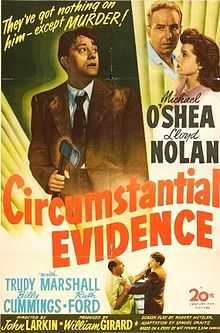Circumstantial Evidence (1945 film)
| Circumstantial Evidence | |
|---|---|
 Theatrical release poster | |
| Directed by | John Larkin |
| Produced by | William Girard |
| Screenplay by |
Robert F. Metzler Samuel Ornitz |
| Story by |
Sam Duncan Nat Ferber |
| Starring |
Michael O'Shea Lloyd Nolan |
| Music by | David Buttolph |
| Cinematography | Harry Jackson |
| Edited by | Norman Colbert |
| Distributed by | Twentieth Century-Fox |
Release dates |
|
Running time | 68 minutes |
| Country | United States |
| Language | English |
Circumstantial Evidence is a 1945 American film noir directed by John Larkin. The drama features Michael O'Shea, Lloyd Nolan, and Trudy Marshall.[1]
Plot
Three witnesses swear they saw Joe Reynolds murder grumpy baker Kenny (Ben Welden) with a hatchet. Joe claims Kenny's fatal head wound was the result of a fall as they argued—the baker hit his head on an oven as he fell—but the eyewitness testimony prevails and Joe is sentenced to death in the electric chair. His buddy Sam Lord has an uphill struggle to prove his innocence.
Cast
- Michael O'Shea as Joe Reynolds
- Lloyd Nolan as Sam Lord
- Trudy Marshall as Agnes Hannon
- Billy Cummings as Pat Reynolds
- Ruth Ford as Mrs. Simms
- Reed Hadley as Prosecutor
- Roy Roberts as Marty Hannon
- Scotty Beckett as Freddy Hanlon
- Byron Foulger as Bolger
Critical reception
Bosley Crowther, the film critic for The New York Times panned the film, writing, "Darryl Zanuck must have had his back turned when Circumstantial Evidence slipped out the front gate of the Twentieth Century-Fox Studio. For a sillier and more tediously worked-out piece of crime melodrama than the picture which opened yesterday at the Rialto hasn't reached Broadway in a long, long time. Circumstantial Evidence is so full of hackneyed and incredible plot turns that one can never get even slightly interested in the involved set of circumstances which almost send a quite innocent, if belligerent, Michael O'Shea to the electric chair."[2]
References
- ↑ Circumstantial Evidence at the Internet Movie Database.
- ↑ Crowther, Bosley. The New York Times, film review, April 21, 1945. Last accessed: February 11, 2010.